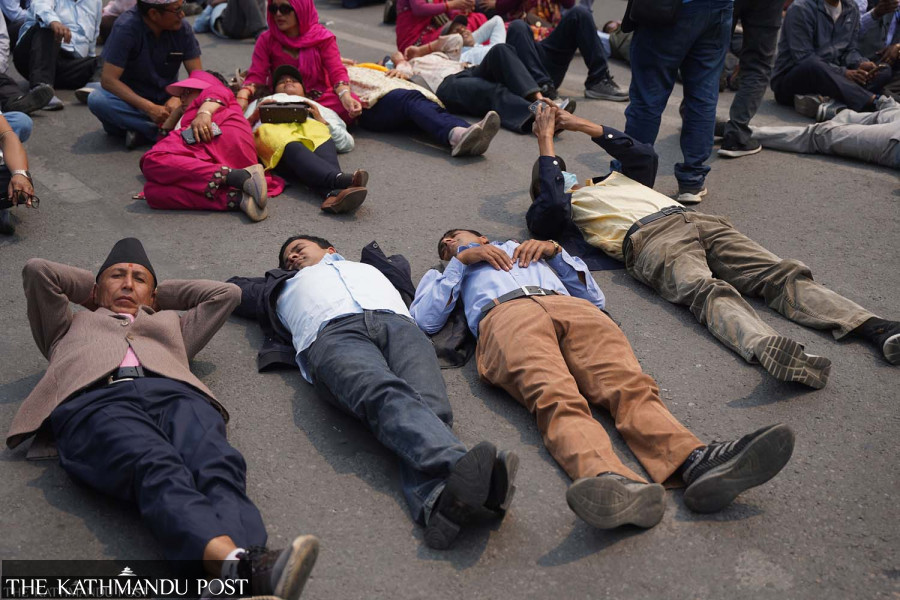National
Parliament to address teachers’ demands
According to Education Minister Bhattarai, federal parliament will convene on April 25.
Post Report
As the teachers’ protest enters its third week, the government has agreed to summon a parliamentary session to pass the School Education Bill, in line with their demand.
According to Minister for Education Bidya Bhattarai, a Cabinet meeting on Tuesday evening decided to convene a House session at 1 pm on April 25 to coordinate and facilitate the passage of the bill.
Over the past few days, both sides have held informal dialogues multiple times. As implementation of all the demands will create pressure on state coffers, Minister for Education Bidya Bhattarai has regularly been holding meetings with Bishnu Poudel, deputy prime minister and minister for finance.
Earlier on Tuesday, Bhattarai, Poudel and Home Minister Ramesh Lekhak had tripartite discussions to assess how many of the protesters’ demands the government can realistically address.
“If the prime minister, Nepali Congress president, CPN (Maoist Centre) chair, and the Speaker want, the school education bill can be endorsed without further delay,” said Nanu Maya Parajuli, joint-chairperson of the federation, who also is the coordinator of the dialogue team. “All we want is the Act incorporating our demands.”
After a few informal discussions, the government agreed to increase the salary of Early Childhood Development facilitators to Rs17,300 a month and determine the order of precedence for teachers, as well as to provide inflation allowance to school employees. The government also assured medical allowances for temporary teachers.
Besides enactment of a new law, the teachers are also demanding benefits on par with civil servants. For instance, if a civil servant dies after serving for 15 years, their family can choose between a gratuity or a pension. However, in the case of teachers, there is a discriminatory provision requiring a mandatory service of 20 years.
Similarly, there is also discrimination in grade promotions between civil servants and teachers. Civil servants receive a grade after 11 months and 16 days of permanent service, while teachers must wait for an entire academic session to qualify for a grade.
Lack of agreement with teachers has already affected the government’s school enrollment campaign that commenced from the second day of Nepali calendar (Tuesday this year). Similarly, no teacher has shown up to mark the answer sheets of the Secondary Education Examination as per the federation’s decision.
The examination controller’s office has already announced the SEE results would be released by June 21—within three months of the test. However, delays in answer sheet evaluation are now expected to push back that deadline. The agitating teachers also have announced to boycott the grade 12 tests slated to start next week.
Not just the government, the ruling parties too have been separately trying to convince the teachers to return to classrooms, promising that their demands would be addressed through the national budget and new law.
Likewise, Speaker Devraj Ghimire held discussion with the education minister, chairperson of the Education, Health and Information Technology Committee of the lower house and the coordinator of the education sub-committee.
Chhabilal Bishwakarma, coordinator of the sub-committee, said they are working to finalise the bill to be presented in the upcoming session of the federal parliament.
The National Human Rights Commission had also expressed serious concern over the ongoing protest and urged the concerned parties to resolve the matter through dialogue.
“It is in line with human rights values for teachers to put forth their demands, express their opinions, and hold peaceful demonstrations for their professional development and institutional interests. However, the closure of schools has been seen as an obstacle to ensuring children's right to education,” reads the commission’s statement.
“Therefore, the commission urges the government to resolve the problems seen in such a sensitive area as education through dialogue, to ensure the resumption of teaching and learning, to formulate education-related laws in a timely manner through adequate consultation with relevant stakeholders, and to implement the agreements previously reached with teachers.”




 10.12°C Kathmandu
10.12°C Kathmandu














